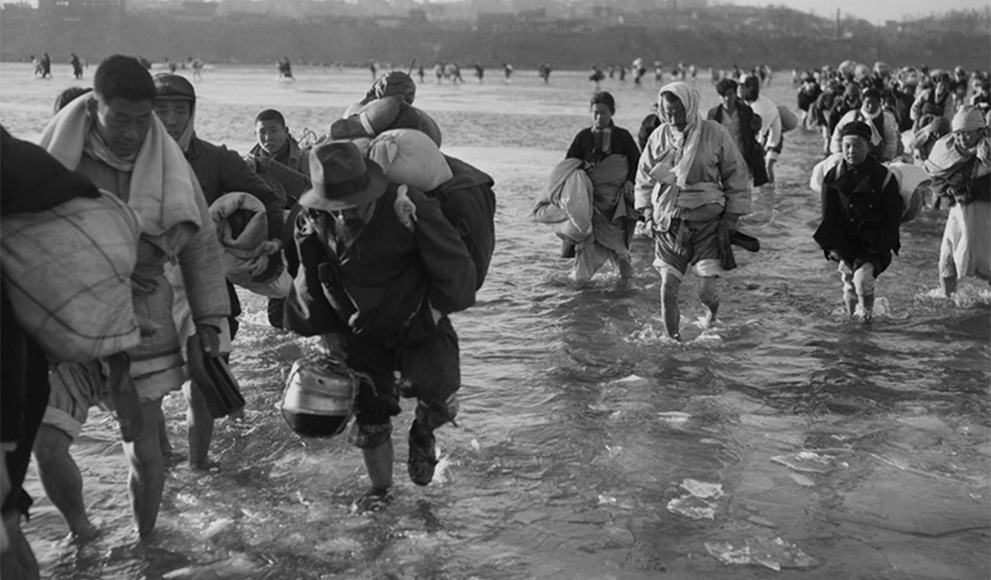Spotlight on Teaching: AMST 238 Forgotten/Remembered: The Korean War and Asian/American Culture

Students in AMST 238 Forgotten/Remembered: The Korean War and Asian/American Culture with Terry Park, visiting lecturer in American Studies, are exploring “America’s Forgotten War” and its lingering impacts through oral histories. On Tuesday, November 24, a collection of interviews conducted by students in the class will be featured in an exhibit called Stories From the Forgotten War: Korean War Oral History on the academic quad.
"[This] is not your average history class—it is a creative exploration of identity and war that challenges the accepted narrative of truth and war that permeates the lived experiences of Koreans, the international Korean diaspora, and Americans," said Grace Park '16, a student in the class. "In my case, as a part of all three, I am able to reconcile and bridge all of those identities by delving into the study of the war that started it all."
AMST 238, according the course description, "offers a transnational cultural history of the Korean War, unspooling its multiple threads in order to come to terms with the way it shaped—and continues to shape—the US's sense of its self, its place in the world, and the heartland of Korean America."
Throughout the semester, students have been conducting interviews with witnesses to the Korean War, including survivors and American veterans, and with others who have been touched by its impacts, including transracial adoptees. Students started with three questions: what was life like before the war; what did you experience or witness; and how has it continued to shape you. The interviews, for some students, revealed unexpected information or personal insights.
Grace Park spoke with Woody Powell, US Air Force Korean War veteran. "As an Army ROTC cadet at Wellesley myself, hearing Woody's story and his first-hand experiences in the country my parents were born brought together two parts of my identity I had never connected before," she said. "Through this oral history project, I had the tools to talk about the Korean War with my family and the ability to see the intricate ways the Korean War has affected my family."
Emily Chun '17 interviewed her maternal grandfather who left Korea and immigrated to Chile in the 1980s. "I learned that he burned his own leg with a toxic plant paste in order to avoid being conscripted into the Korean army," Chun said. "I also learned that I am a direct product of such Korean War horrors as these that have been ghosted into my family history."
Chun said she spoke to her grandfather via video chat for an hour and experienced a physical reaction to the conversation. "During the hour long video chat session with him…there was a large lump lodged in my throat…a lump of guilt and incredulity that it took me a school oral history project to ask him about his war experience."
She continued, "I am grateful for it though. I've learned that oral histories are not just for collecting and preserving information, [their] power lies in its production of counter-knowledge." She said she hopes people attend the event on Tuesday get to see the production of counter-knowledge in the form of intergenerational storytelling. "It's powerful stuff," she said.
The interviews were recorded and, for the exhibit, audio files will be attached to a "bojagi," a traditional sack used by Korean refugees to carry their things as they fled from the war's violence. Students will construct the exhibition bojagi in class on Tuesday morning from blue and white fabric representing the colors of the official Korean reunification flag then spread the sacks around Wellesley’s academic quad. The audio files will be accessible by way of a QR code; visitors can scan the code with their smart phones (using any of a number of freely available scanner apps) for more information.
"Each sack will have a 9 by 12 photograph of the interviewee, along with their name, date of birth, birthplace and current residence," said Professor Park. "Each interviewee's unique QR code will take visitors to that interviewee's oral history page where they can listen to two audio clips—a 3-5 minute clip highlighting a particularly interesting story, and a longer, 10-20 minute clip that addresses the 3 broad interview questions. Each page also includes an essay that historically contextualizes the oral history given by the interviewee."
Rebecca Darling, assistant director for instructional technology, worked with the students on the technology for the project. Professor Park praised her work and said, "None of it would've been possible without her."
Professor Park was involved in a similar project in 2010 organized by the National Campaign to End the Korean War, a group comprising scholars, activists, veterans, and others. An actor, he also preformed an off-Broadway show, 38th Parallels. In addition to the exhibition, he has assigned AMST 238 students a number of oral history-based texts, both written and visual, and invited the NYC-based organization "Intergenerational Stories to Break the Silence" to give a presentation on their work.
"Professor Park pushes our class to think outside the box of what we consider to be the truth or reality," Grace Park said. "For me, as an Asian American, this class is a classic example of why we need ethnic studies in the United States. The struggle of where we come from and why we are here can be an academic struggle. Ethnic studies give us room to take on that struggle with a bit of help from our classmates and professors."
A class website cataloguing the oral histories collected by Wellesley students will be available later in the day on Tuesday. Further, because the project is portable and mobile, Professor Park said he may place it in different locations around campus this semester and next.
